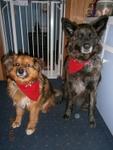I'm thinking about taking over running puppy classes (socialisation - ages 3 - 6 months) at a new pet retail store where I live as I used to do it a few years ago at a previous job. We used a 4x sessions, 1 hour per session format but I am struggling to remember what was covered in the lessons. Does anyone have a list of topics that were covered each session when you took your pup through socialisation and/or basic training lessons?
Thanks







 Reply With Quote
Reply With Quote
 I do agree with NILIF and body handling, though. That stuff should begin Day 1 with any dog of any age.
I do agree with NILIF and body handling, though. That stuff should begin Day 1 with any dog of any age.








Bookmarks